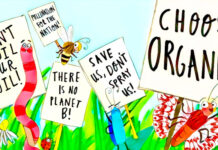Transparency and full accessibility to reliable data on pesticide use is essential to monitor health risks to populations, farmers and the environment. This fundamental right should finally be guaranteed in Europe by a special regulation(Statistics on Agricultural Input and Output, SAIO). However, the planned regulations seem to gain opacity as they approach approval. Civil society is mobilizing for the necessary transparency in the following document, signed by 75 independent organizations. (1)
Reliable and accessible data on pesticides, the appeal
‘The undersigned organizations express deep concern about the direction the negotiations within the trialogues on the reform of the Agricultural Statistics Regulation (SAIO) are taking.
We call on member states to support the European Parliament’s proposals by ensuring that accurate data on pesticide use are collected and published without further delay.
The importance of pesticide data
To ensure that European agriculture moves away from pesticide-intensive practices, we need accurate public data on what pesticides are used where, when, on what crops, and in what quantities. Such data in fact:
● make it possible to meaningfully measure progress and identify which sectors or crops and in which regions face difficulties in transitioning to sustainable agriculture practices;
● allow independent scientists and the scientific community to connect the dots between exposure to specific pesticides or a cocktail of them and harm to the environment and/or people;
● serve the work of public authorities to verify whether the data submitted for pesticide approvals actually correspond to their actual use;
● are essential for public authorities to more efficiently list which pesticides end up in water and thus need to be monitored so that appropriate measures can be taken to protect, for example, rural residents and biodiversity;
● Rebuild EU citizens’ trust in national governments, EU institutions and their willingness to protect public health and the environment despite the weight of private interests such as agrochemical lobbies.
Gaining the trust of EU citizens
This trust of EU citizens is currently broken because it is now obvious that pesticide use and its risks to human health and the environment are out of control. Our legal system was to allow only pesticides that
(i) have no immediate or delayed harmful effect on human health
(ii) no unacceptable effects on plants and
(iii) No unacceptable effect on the environment.
Unfortunately, the way this authorization system has been applied in practice raises very serious questions about the safety of pesticides on the EU market. Evidence of unacceptable harm to biodiversity and frontline workers-farm workers-is piling up. This system does not benefit farmers economically either, and there are feasible alternatives to intensive pesticide farming.
Access to pesticide data only through the courts
In light of the proven impact of pesticides on public health and the environment and the need to shift to alternative models of agriculture, the paucity of pesticide use data collected and published is incomprehensible.
California put in place a comprehensive framework and public database on the subject back in the 1990s. What is even more surprising is that the data exist but are not exploited by public authorities.
In fact, farmers and all other professional pesticide users have been obliged-for more than 10 years-to keep records of the pesticides they use available to public authorities. However, these records are not collected systematically. To access these records, members of the public, e.g., doctors, scientists, an agricultural workers’ union or a water supply company, have no choice but to follow a lengthy and cumbersome procedure, often requiring recourse to the courts.
The key aspects of the negotiations
In light of the latest public information, negotiations appear to be moving in a more positive direction. However, many key aspects are still extremely worrisome and unclear. More specifically:
● Although we welcome the French Presidency’s recognition of the need for annual pesticide use data and electronic collection of farmer records, we are deeply concerned by the proposed compromise text as it does not guarantee that farmer records will be collected soon enough. In fact, the first year in which this data would be collected would be 2028, which is 6 years from now. Meanwhile, irreversible damage to biodiversity and people’s health is bound to occur due to out-of-control pesticide exposure.
● There is also a high risk that these documents will never actually be collected, as this will depend on the harmonization of a digital format to be decided in a separate procedure (implementing act under Regulation (EC) No. 1107/2009) without any time constraints or opportunities for the European Parliament to have a say.
● Looking forward to 2028, the proposed compromise suggests only one survey (in 2026). This is not enough to provide a clear picture of progress toward the reduction targets set for 2030 in the Farm to Fork strategy. Moreover, this survey will cover only a selection of common crops among member states and will be defined only later (through implementing acts) in a procedure in which the European Parliament will have no say.
● Finally, while we welcome the recognition that the rules on access to documents and access to environmental information remain fully enforceable, the proposed regulatory text regarding the release of data leaves too much room for interpretation. It does not provide the necessary legal certainty that data on all pesticide uses and sales will actually be published by active substance in full compliance with rules on access to environmental information.
Four requests to the negotiators of the SAIO regulation
If the compromise text on these issues becomes law, the data collected on pesticide use would be too little, too late, with worrying uncertainty about what will actually be published.
We therefore urge the negotiators, and in particular the Council, to take these concerns into account, and in particular to:
1. Shorten the transition period for the first digital collection of all farmer records for all crops to 2025. Speed is a matter of commitment and investment by national governments. This investment is long overdue: the need for data on pesticide use was already recognized in 1993.
2. Make annual collection of farmers’ records mandatory in the SAIO text. This collection is carried out by the national authorities responsible for implementing the Pesticide Regulation.
3. Create a requirement for the Commission to adopt-by delegated act under the SAIO-by January 1, 2023, the harmonized electronic format of farmer registers. At the very least, if this electronic format is to be defined under an implementing act pursuant to Regulation (EC) No. 1107/2009, this act must be adopted by July 2022.
4. Adopt a measure on the dissemination of data on the use and sale of pesticides similar to what Parliament has proposed, explicitly stating in advance what level of detail will be published. It is essential that data be published by active substance, area treated (ha) and by crop.
Points of concern
We also reiterate our concerns in relation to points that, to our knowledge, have not yet been discussed in the trialogues:
● Data on pesticide use at least at the regional level (NUTS3) are essential for the data to be useful. Data should also be sorted between pesticides used in organic farming and those used in conventional farming.
● There are too many potential exemptions in the Commission’s proposal that could unduly limit the information reported to Eurostat on pesticides. These waivers or exemptions do not apply to pesticide data because the data have been available for 10 years and their collection is long overdue.
For truly modern and sustainable agriculture, governments must invest in relevant data systems and put these data in the public domain where they belong. This cannot wait until 2028′.
Notes
(1 ) SEE https://www.pan-europe.info/resources/letters/2022/05/joint-statement-urgent-need-precise-public-data-use-pesticides-across
The document is endorsed by 75 organizations, of which we indicate area of action and contact person: ADENY (FR, Sylvie Beltrami), Agroecology Europe (EU, Lili Balogh), Alliance for Cancer Prevention (UK, Helen Lyn), Apicultural Research Educational Center (GR, Fani Hatjina), Apimondia (GR, Fani Hatjina), ÄrztInnen für eine gesunde Umwelt (AT, Hanns Moshammer), Asociación Vida Sana (ES, Ángeles Parra), Association Organic Gardens for Education (SI, Anamarija Slabe), Aurelia Stiftung (DE, Thomas Radetzki), BeeLife (EU, Noa Simon), Biom Association (HR, Željka Rajković), BirdLife Europe and Central Asia (EU, Ariel Brunner), BirdLife The Netherlands (NL, Cees Witkamp), BugLife (UK, Matt Shardlow), Center for International Environmental Law -CIEL (CH, David Azoulay), ClientEarth (EU, Anaïs Berthier), Compassion in World Farming (EU, Olga Kikou), Coordination gegen BAYER-Gefahren (DE, Jan Pehrke), Corporate Europe Observatory – CEO (EU, Nina Holland), Deutsche Umwelthilfe e.V. (DE, Sascha Müller-Kraenner), Dutch Bee Conservation (NL, Maaike Molenaar), Earth Thrive (UK, Zoe Lujic), Earth Trek (HR, Damir Grgić), Eco-Hvar (HR, Vivan Grisogono), ECOCITY (GR, Eri Bizani), Ecodesign competence center (LV, Jana Simanovska), Ecologistas en Acción (ES, Koldo Hernandez), EEB (EU, Jeremy Wates), EFFAT (EU, Kristjan Bragason), Égalité (IT, Dario Dongo), EPBA (FR, Cindy Adolphe), EURAF (EU, Gerry Lawson), Eureau (EU, Oliver Loebel), FODESAM (ES, Carlos de Prada), Friends of the Earth Malta (MT, Martin Galea De Giovanni), Generations Futures (FR, Nadine Lauverjat), Global 2000 (AT, Helmut Burtscher-Schaden), Green Federation “GAIA” (PL, Jakub Skorupski), Health and Environment Alliance (EU, Angeliki Lysimachou), Hnutí DUHA – Friends of the Earth Czech Republic (CZ, Martin Rexa), Hogar sin Toxicos (ES, Carlos de Prada), Hungarian Agroecology Network Association (HU, Lili Balogh), IAWR (DE, Wolfgang Deinlein), IFOAM Organics Europe (EU, Eric Gall, Policy Manager), Institute Marquès (ES, Mireia Folguera), Integrated Resources Management Co ltd – IRMCo (MT, Anna Spiteri), Justice Pesticides (FR, Arnaud Apoteker), Kecskeméti Szatyor Közösség Egyesület (HU, László Szigeti), Latvian Fund for Nature (LV, Baiba Vitajevska-Baltvilka), Lipu – BirdLife Italia (IT, Federica Luoni), LPN (PT, Inês Machado), Mouvement Ecologique Luxembourg (LU, Roger Dammé), Nature & Progrès Belgique (BE, Marc Fichers), Navdanya International (International, Elisa Catalini), Neo-Agri (FR and ES, Sidney Flament-Ortun), NOAH – Friends of the Earth Denmark (DK, June Rebekka Bresson), Pesticide Action Network (PAN) Europe (EU, Martin Dermine), Pestizid Aktions-Netzwerk e.V. – PAN Germany (DE, Susanne Smolka), PAN Italy (IT, Fabio Taffetani), Pesticide Action Network Netherlands (NL, Margriet Mantingh), Plataforma Transgenicos Fora (PT, Lanka Horstink), Polish Ecological Club (PL, Maria Staniszewska), Pollinis (FR, Barbara Berardi Tadié), ROMAPIS (RO, Constantin Dobrescu), SEO/BirdLife (ES, Tamara Rodríguez Ortega), Sociedad Españoña de Agricultura Ecológica (ES, Concha Fabeiro), SNA (FR, Frank Alétru), SOS Faim Belgium (BE, Jonas Jaccard), Stadtbienen e.V. (DE, Johannes Weber), SumOfUs (International, Eoin Dubsky), Umweltinstitut München e.V. (DE, Vera Baumert), Union Nationale de l’Apiculture Française (FR, Clémence Rémy), Via Pontica Foundation (BG, Ina Agafonova), WECF International (NL, Sascha Gabizon), ZERO – Associação Sistema Terrestre Sustentável (PT, Pedro Horta).
Professional journalist since January 1995, he has worked for newspapers (Il Messaggero, Paese Sera, La Stampa) and periodicals (NumeroUno, Il Salvagente). She is the author of journalistic surveys on food, she has published the book "Reading labels to know what we eat".








